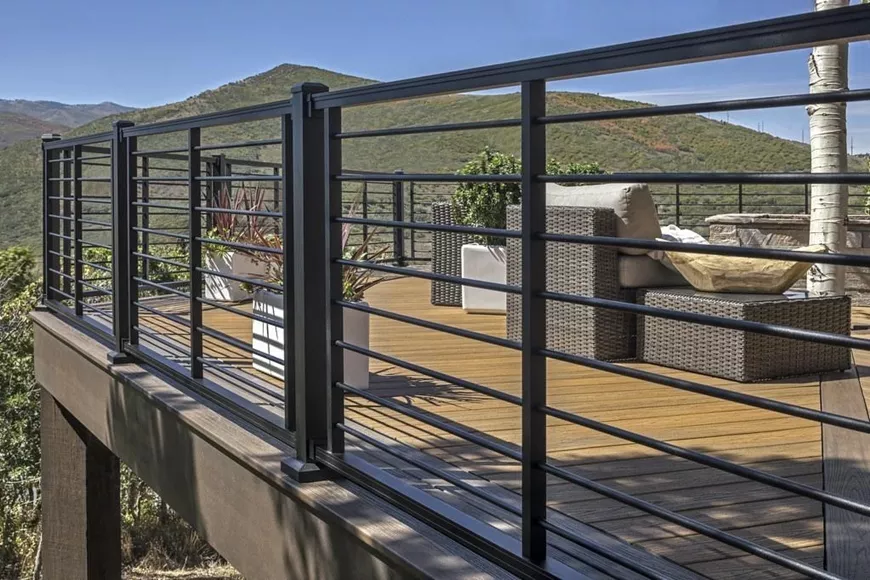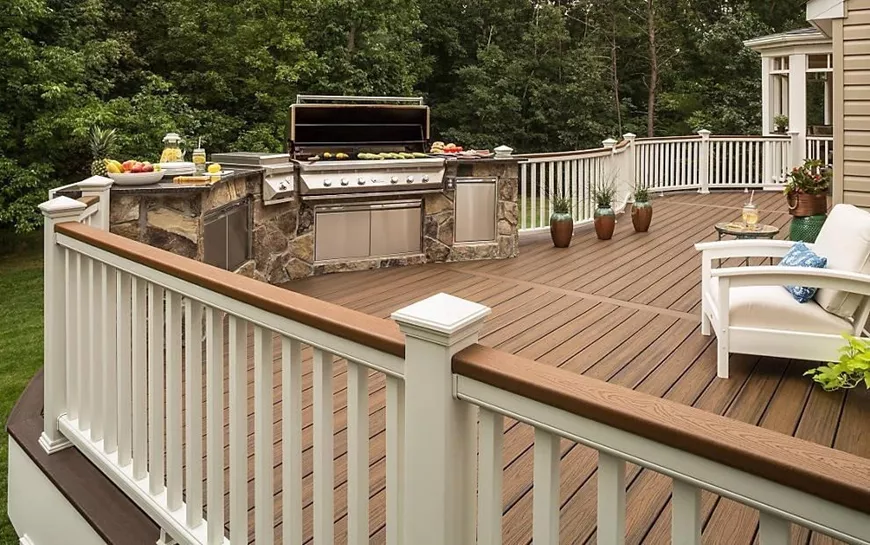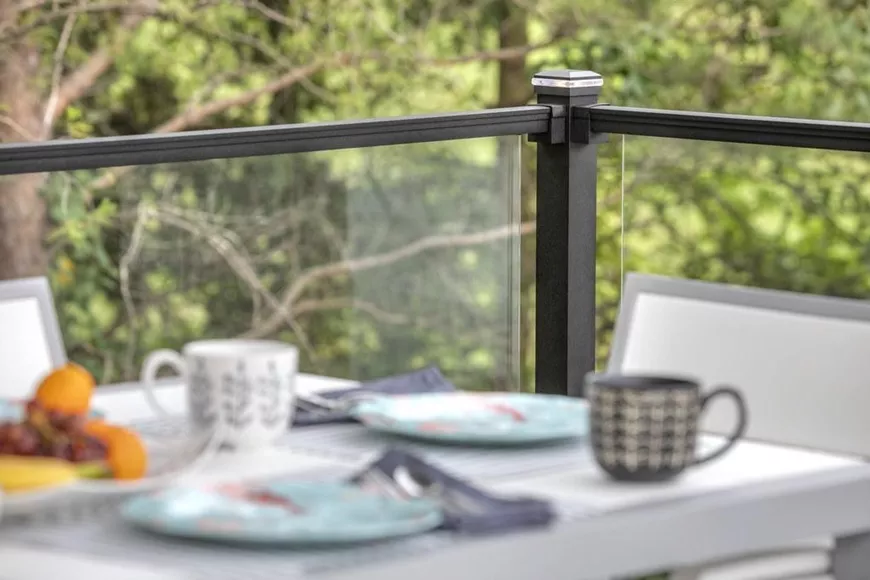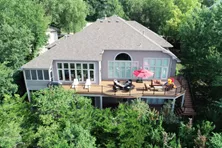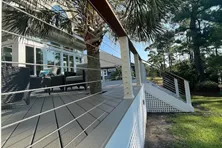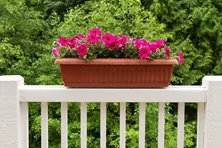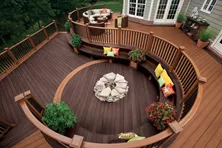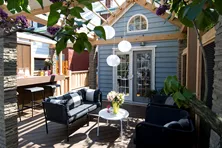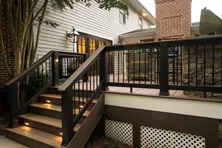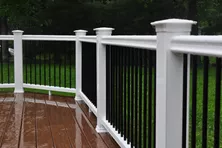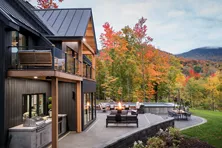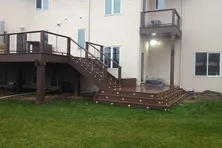Composite vs Aluminum Deck Railing
A fair comparison of composite vs aluminum railing involves weighing several factors and preferences. Both materials have their own sets of strengths and weaknesses. For instance, aluminum railing is a bit more durable, and composites are a bit more economical in terms of costs and provide a more traditional (less contemporary) style.
Those are just the tip of the iceberg when it comes to examining the pros and cons of these two railing materials. Learn more about the differences between composite vs aluminum railing, and how to pick the right railing for your project.
Cost
How much does aluminum railing cost?
The average material cost of aluminum railing is around $40-$55 per linear foot. However, this price can increase considerably when accounting for installation fees. There are many factors that can dictate final installed cost of a metal deck railing. The complexity of the install, DIY vs. hiring a contractor, and the materials chosen can all drive significant changes to installation costs. Fortunately, due to the low maintenance aluminum railing requires, the lifetime cost is often less than other materials, such as wood.
How much does composite deck railing cost?
The average cost of composite railing is around $30-$55 per linear foot. The same factors that can drive variances in installation costs for aluminum railing also affect composites. Composites are also available in a much wider range of quality than aluminum materials, which can further affect pricing. Composite railing is also lower maintenance, but manufacturer warranties for composites are, at times, shorter than some aluminum products. Both can offer lower lifetime costs than products that require intense maintenance.
Maintenance and Upkeep
Aluminum Railing
Aluminum is typically given a protective coating to prevent rusting (typically, powder coating), which makes it fundamentally waterproof. It’s also highly tolerant to drastic changes in temperature. However, performing basic levels of upkeep is still necessary to keep aluminum railing looking its best.
Rails will need to be kept free of debris and occasionally cleaned of environmental contaminants using mild soaps. However, powder coated surfaces can interact with certain cleaning agents. It’s important to follow manufacturers’ guidelines when selecting cleaning products.
Aluminum railing can also be damaged by using abrasive materials, like steel wool pads. Keeping aluminum railings in pristine condition may require power washing twice annually, but regular care can greatly reduce the intervals between washing.
Lastly, it’s important to keep aluminum coated and protected from the elements. Most manufacturers offer touch-up kits that are nearly impossible to see when applied correctly should the powder coated finish get scratched.
Composite Railing
Different types of low-maintenance composite deck railing options will require slightly different levels of maintenance. Overall, the maintenance required for composite railing is quite low. Use gentle soaps to occasionally scrub your railing with a soft bristle brush and thoroughly rinse off any chemicals used.
When comparing composite to wood railings, you’ll find composites have the advantage in most ways. However, it’s worth noting that, just like aluminum railing, the manufacturer is the authority in the best ways to keep their composite products clean.
Lifespan and Durability
Aluminum Railing
The average lifespan of aluminum railing is difficult to gauge. Most manufacturers offer at least a 20-year warranty, but it’s not uncommon to find lifetime warranties for aluminum railing because the material is exceptionally resilient. However, it’s important to read the fine print of a given product’s lifetime warranty because it may include certain caveats and conditions that may void the warranty.
Aluminum or composite deck railing are both exceptionally well suited to enduring the elements, but aluminum is a physically harder material. As a result, aluminum railing often offers better protection against scratches and dents.
Composite Railing
The average lifespan of composite railing is around 20-25 years, but the outcome heavily depends on the quality of the composite and how well it’s maintained. High-quality composites that are well-maintained can last for at least 25 years -- or potentially more, which is why it’s not uncommon to see composite railing carry a 25-year performance warranty.
While composite doesn’t have the hardness of metal, composite railing vs aluminum railing is a fairly even matchup when it comes to weatherproofing. Composite can be protected against mold, mildew, stains, and essentially every other vulnerability of wood.
Color Options
Aluminum Railing
Aluminum railing is typically available in fewer color options than composite. Most aluminum railing is offered in black, white, and a shade of brown. For example, Trex Signature® Railing provides three main railing color options. You can discover more aluminum railing color options here. However, despite the lack of color options, most aluminum railing manufacturers offer several designs that can set your project apart.
Composite Railing
You can find a fairly wide range of color options for composite railing. For instance, Trex Transcend® Railing provides nearly twice as many options as the aluminum alternative. This extended range of colors usually allows composites to provide a better compliment to their surroundings. You can discover more composite railing color options here. On the other hand, most composite product lines offer fewer infill options compared to aluminum. It really boils down to what suits your tastes, project needs, and budget. Both products are excellent premium alternatives to wood that will provide years of low-maintenance enjoyment.
Learn everything you need to know about deck railing here.
Glass Deck Railing Ideas and DIY Installation Tips
All glass panels used for deck railings must be safety-tempered and shatter-resistant. Learn how to install glass railing panels and get ideas for your deck.
5 Cable Railing Ideas to Inspire Your Deck or Porch Railing
Cable railing adds a modern touch for those looking to add a unique twist to their deck or porch. These top ideas offer inspiration and guidance on cable railing for your deck.
Steps To Build & Secure A Deck Railing Planter
Railing planters are an easy way to add some color to your deck without taking up space. Follow these simple steps and get started on your railing planters today.
Deck Skirting
Skirting can be an attractive feature that can be added to any low-level deck.
Deck Bench Ideas
Whether built-in or stand alone, deck benches are an excellent seating option. Get ideas and inspiration for your deck bench design with Decks.com.
Deck Bar Ideas to Get Your Backyard Ready for Summer
Want to transform your backyard into the perfect space for entertaining? Check out our outdoor deck bar ideas!
More Helpful Resources
Explore Articles by Topic

Footings
Information related to installing frost footings for decks
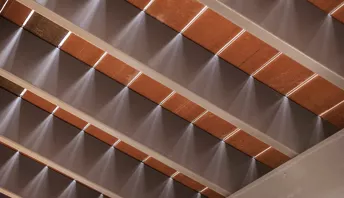
Framing
Learn structural framing methods
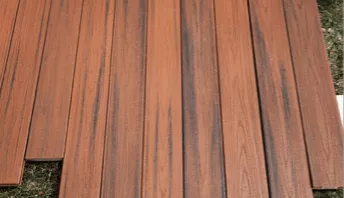
Decking
Learn about wood and composite decking materials
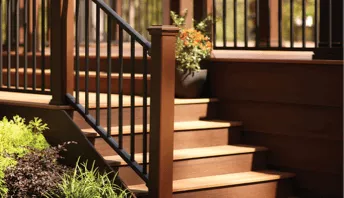
Stairs
An in-depth look at the complex issue of how to build stairs
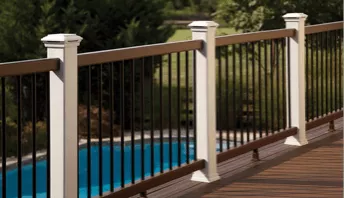
Railings
How to install guardrails and handrails to meet IRC code
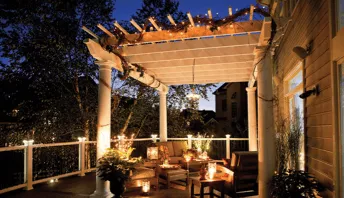
Features
An overview on water drainage, benches, planters and lights
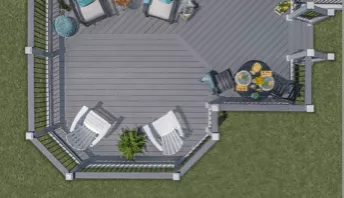
Design
The basics of deck design
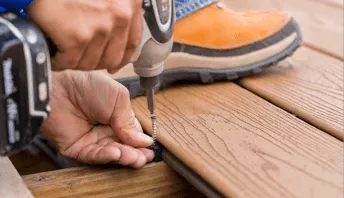
Planning
Learn about permits and working with contractors
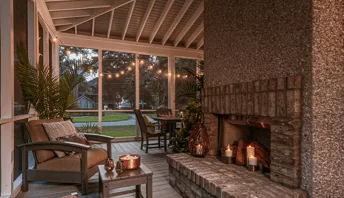
Porches & Patios
Build a covered deck to enjoy all seasons
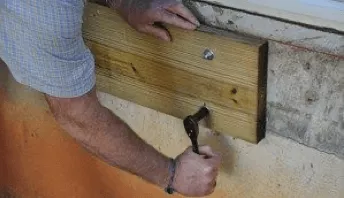
Ledger
Proper attachment techniques
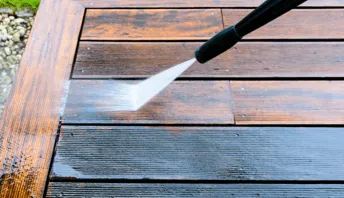
Care
Maintain your deck to maintain your investment
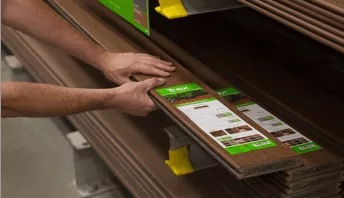
Materials
An overview on water drainage, benches, planters and lights
Reddit Railing Questions Answered
Deck railing is an essential component of any deck, providing both safety and style. However, with so many materials, designs, and installation factors to consider, questions often arise.
Deck Railing Codes
Learn about the building codes that regulate guardrails. How high do rails need to be? What are the rail infill requirements?
How to Install Composite Deck & Porch Railings
Composite deck and porch railings offer a low-maintenance option for railings. Learn how to install composite railing and get ideas for your deck at Decks.com.
5 Best Ways on How to Hide Trash Cans Outside
Outdoor trash cans can be an unwanted eyesore. Discover how you can easily cover them up and add an extra touch of beauty to your yard.
Underrated + Overlooked Features to Consider Adding to Your Deck
Want to give your deck or patio a unique look? These creative deck ideas will upgrade your deck in no time.
How to Install Recessed Stair Lighting
Step-by-step instructions for how to install low-voltage lights on your deck stair risers.
Explore Articles by Topic

Footings
Information related to installing frost footings for decks

Framing
Learn structural framing methods

Decking
Learn about wood and composite decking materials

Stairs
An in-depth look at the complex issue of how to build stairs

Railings
How to install guardrails and handrails to meet IRC code

Features
An overview on water drainage, benches, planters and lights

Design
The basics of deck design

Planning
Learn about permits and working with contractors

Porches & Patios
Build a covered deck to enjoy all seasons

Ledger
Proper attachment techniques

Care
Maintain your deck to maintain your investment

Materials
An overview on water drainage, benches, planters and lights




